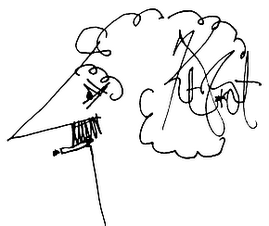Link here to Nuvo in Indianapolis
Excerpt from Hoppe: One evening not that long ago, my son and I met Mr. V for dinner at a downtown hotel. As he came down the stairs, before so much as saying hello, with eyes wide, he asked, “Why did we ever leave Indianapolis?”
“So you could be an artist?” I asked in return.
Kurt Vonnegut’s relationship to this city was complicated. It was a city his family helped build, a place where he claimed to have a happy childhood and a public school education that he treasured. But his father, an architect, couldn’t find sufficient work here and his mother committed suicide. When Mr. V, arguably at the height of his powers, went to the department store L.S. Ayres for a book signing in the late 1960s, it’s said nobody showed up.
This, of course, changed.
Most recently, people waited for hours for the box office to open at Clowes Hall so that they might get tickets for the speech he was going to give here this April 27. Many were disappointed when it quickly became clear the supply wouldn’t come close to meeting the demand.
I met Kurt Vonnegut for the first time here in Indianapolis, in 1991. He had agreed to be the keynote speaker at a book festival I organized called Wordstruck. Although I read “Cat’s Cradle” when I was in college, for some reason I hadn’t picked up a Vonnegut book since. Maybe that was because he was everywhere, a ubiquitous part of the cultural landscape. At any rate, I was just hoping the guy it was my job to drive around town would be easy to get along with.
I had nothing to worry about. Mr. V was staying with childhood friends near Williams Creek. When I delivered him there, I was asked to come inside for lunch. This was a gift. The afternoon was spent drinking coffee, smoking cigarettes and catching up. At one point our hostess leaned close to me and whispered, “He was such a beautiful boy, with the longest eyelashes I’d ever seen.”
Needless to say, I began reading the books — all of them, as their author took justifiable pride in saying, still in print. Oh, what I’d been missing! There was the humor, that dark sense of human comedy and hapless mischief. But there was also Vonnegut’s slapstick way of collapsing fact and fiction, like that boy he wrote about, rough-housing with his favorite dog on the living room carpet, as a way of seeking something like the truth.
And there was the voice. The voice above all.
Mr. V told me he learned to write when he worked for the Chicago News Bureau after the war, covering accidents and crime. The reporters called in their stories on the phone; they spoke and someone on the other end typed the words. No wonder reading a Vonnegut book is like having the man himself by your side. That voice is what enabled an otherwise avant-garde artist to be embraced by a massive public. It made Kurt Vonnegut the literary equivalent of the Beatles.
Many people, even admirers, persist in calling Kurt Vonnegut cynical. I’ve never understood this. A cynic believes the truth doesn’t matter. If going to war suits him, he’ll make up reasons for doing it and to hell with the consequences. A cynic believes the only real crime is getting caught.
Truth, or at least our efforts to try and figure out what that means, always mattered to Mr. V. What he’d seen of human behavior made him a pessimist about the future we’re making for ourselves. But this was also a man who, upon hearing of the almost inconceivably simultaneous deaths of his sister and her husband, responded by adopting three of their children.
“There’s only one rule I know of babies,” he wrote. “‘God damn it, you’ve got to be kind.’”
Tonight the sunset breaks through heavy clouds. Birds are singing in the crisp, platinum-colored air. I can imagine the smile this scene might put on Kurt Vonnegut’s face, him calling out: “Get a load of this!”
It’s all he ever wanted us to really, really see.
Link to the interview and other Nuvo coverage
Sunday, May 6, 2007
Subscribe to:
Post Comments (Atom)


No comments:
Post a Comment